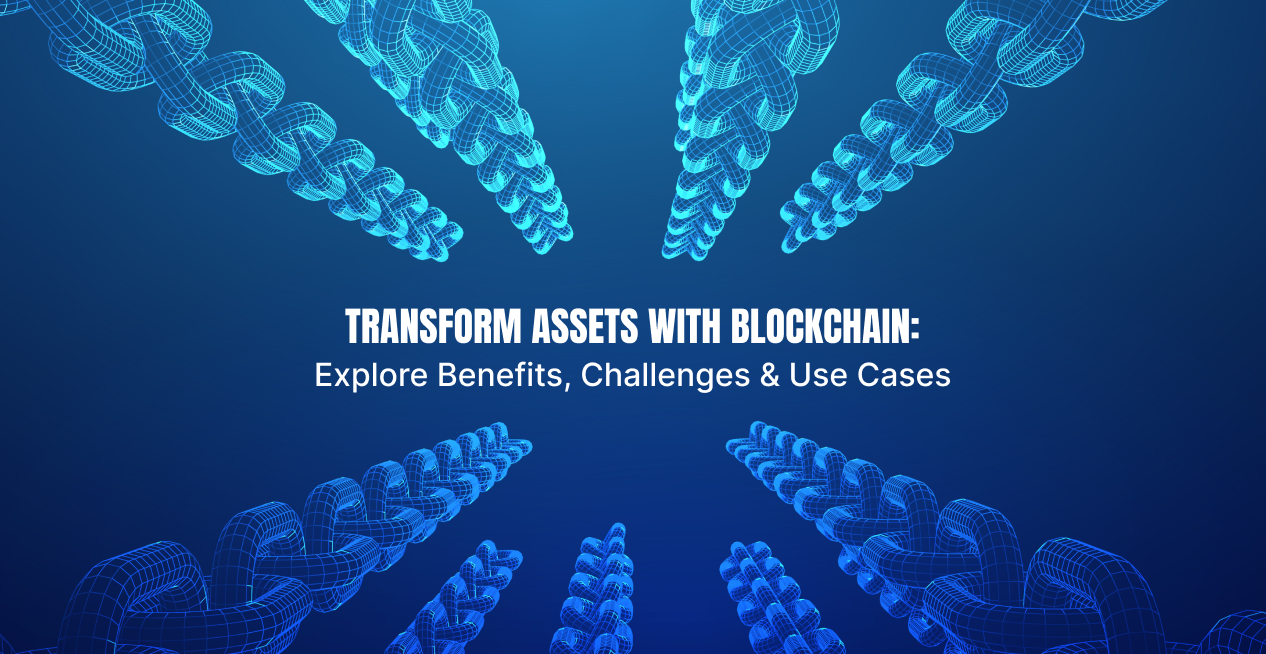- Advantages of Asset Tokenization
- Democratization and Fractionation of Investment
- Transparency
- Better liquidity of assets and accessibility
- Time and Cost Reduction
Introduction
Ever since its inception in 2009, Blockchain technology has revolutionized the very way we conduct business online. Formerly created by someone with the pseudonym, Satoshi Nakamoto, the first blockchain technology that was introduced to the masses was bitcoin. Genesis block was the first bitcoin to be successfully mined and rest is history! Read on to know more about the technological wonder – blockchain.
What is Blockchain?
A blockchain is a decentralized and distributed ledger technology that records transactions in the form of blocks. These blocks are stored on a multinodal network, i.e it is stored on multiple systems throughout a network and no single entity has authority over it. This not only makes blockchain less breachable but also more transparent. A blockchain database uses a peer to peer network along with a distributed timestamping server which maps all changes ever done to the network. Another added advantage of using the blockchain technology is that such a multinodal technology removes infinite reproducibility of a digital asset. This means that an asset cannot be copied, forged, recreated and misused if it’s on the blockchain network.
One often assumes that digital assets on a blockchain network are not safe given the volatile and less secure nature of the internet. It is often believed that buying assets online is a high risk since ownership of these assets are mutable. This can be proven wrong by the concept of Asset Tokenization. Let’s have a look at what asset tokenization entails and its importance in the blockchain network.
Asset Tokenization and Its Importance
Asset Tokenization in the blockchain is the process that ensures that ownership of digital assets remains immutable. As the name suggests, digital asset tokenization involves an issuer who issues digitized token on the distributed ledger. These tokens represent ownership rights of digital, physical, fungible and non fungible assets. Fundamentally acting as digital certificates of object of value, tokens guarantee its owners custody over their assets when held in secure crypto wallets.
Big consultancy firms such as Deloitte, BNY Mellon, EY agree with the fact that Asset tokenization holds the power to disrupt markets and industries in its wake, all for the better! The global securities industry is witnessing a huge shift towards asset tokenization. Many big conglomerates such as Microsoft and Vanguard are already investing in projects involving digitizing industrial assets and securities. This makes asset tokenization the most popular blockchain application led with maximum adoption rate.
Advantages of Asset Tokenization
The rise of popularity of Asset Tokenization can be attributed to its variety of benefits. Here are the top 4 advantages of asset tokenization which makes it a successful asset to industries.
Democratization and Fractionation of Investment
Most major benefit of tokenization is the flexibility of division of assets for its users. Asset Tokenization allows users to divide a large part of an asset into lower value smaller assets, also known as fractionation of assets. This means that an asset like real estate can be sold for smaller parts rather than in a single token thus turning out more profitable. This also encourages a large party of people, especially small and medium enterprise owners to have access to the asset ,thus facilitating purchase and sale of that asset.
Transparency
A digital ledger is more reliable than a manual one as it is more accurate, and leaves a digital footprint which can be easily followed. All nodes in the blockchain network provide for the highest security and transparency, both at the same time! It successfully keeps individual copies of histories of transactions and alterations. This method immediately recognizes possible attempts to tamper with one of them. This lays the foundation for increasing people’s trust in making digital investments.
Better liquidity of assets and accessibility
Decentralization attribute of blockchain allows users to access the network and make transactions from anywhere at any given time. Better yet, the assets that one can own and trade on a blockchain includes otherwise illiquid assets such as real estate, antiques, artworks, cars etc. thus providing higher liquidity to its users.
Time and Cost Reduction
In blockchain technology, owners and buyers contact each other directly without having to resort to intermediaries who in turn levy a substantial fee. This reduces resources and money spent on third party services. Also, in blockchain, transactions take a fraction of seconds to go through, which is extremely efficient compared to traditional transactions that can take up to weeks!
Risks and Challenges
Even though Asset tokenization is a revolutionary technology, it still has limitations. These include:
Regulatory Challenges
Lack of stringent regulatory compliance laws are a deterrent when it comes to even wider and mainstream adoption of tokenization by businesses. This, however, is bound to be a temporary challenge. With advancements in technology, one can expect better regulations and laws for tokenization.
Technical Challenges
Most conventional tokenization systems do not support all data types inputs while tokenization of assets, severely limiting support for analytics. Also, the lack of context around sensitive data inputs prevents most tokenization systems from securely managing the tokenization process.
Lack of Technical Knowledge
With a serious lack of technical skills, Asset tokenization becomes a limited technology option for small and medium sized enterprises who do not have knowledge, skill set or resources for tokenizing assets.
Use cases of asset tokenization
Tokenization of art
The earliest application of asset tokenization has been seen in the art industry. With the help of NFT’s or Non fungible token, art can be uniquely identified and traded on various platforms. Online Art market has seen a ginormous rise with sales reaching upto 2.6 billion dollars on NFT platforms. From famous memes to classic paintings, NFT’s are turning out to be a preferred mode for trading art.
Tokenization of Real Estate
A real estate token is a real estate property which has been converted to a blockchain token that can be traded on the blockchain network. A real estate trade with such tokens, done on a blockchain network, is far more superior than traditional real estate transactions for a variety of reasons. This is because when a purchase is made via blockchain, the buyer receives property rights almost instantaneously without the need of intermediaries or extensive paperwork.
Tokenization of Physical Commodities
Markets involving trades of physical commodities have many overhead charges which is why it is slowly shifting to paperless transactions. One can easily tokenize physical commodities like gold, silver or diamond amongst others and trade them without intermediaries and hidden costs.
Cargo Assets Tokenization
A new avenue where assets are being conveniently tokenized is cargo logistics and shipments. Cargo industry relies heavily on the Bill of Landing which is basically a certificate of ownership of assets. A company by the name of CargoX has successfully tokenized this Bill of Landings certificate. The company created an open token system based on the Ethereum platform by the name SmartB/L which is a token of cargo that is exchanged between vendor and buyer.
Conclusion
Most of us have grown up watching sci-fi movies which often talk about a futuristic world with extreme digitization of all reality. Asset Tokenization and blockchain takes us one step closer to that future. Digitized assets are the future and to be able to buy one, it’s important to own crypto wallets. OpenXcell is a fine software and blockchain development company which can get you started with secure software solutions. The company is also known to deliver stellar consultancy services for handling and managing cryptocurrency and crypto wallets while leveraging the best of capabilities of blockchain technology to businesses.
COMMENT
No Comments found.
DETAILED INDUSTRY GUIDES
Software Development - Step by step guide for 2021 and
beyond | OpenXcell
Learn everything about Software Development, its types, methodologies, process outsourcing with our complete guide to software development.
Headless CMS - The complete guide for 2021 | OpenXcell
Learn everything about Headless CMS along with CMS, its types, pros & cons as well as use cases, and real-life examples in a complete guide.
Mobile App Development - Step by step guide for 2021 and beyond | OpenXcell
Building your perfect app requires planning and effort. This guide is a compilation of best mobile app development resources across the web.
DevOps - A complete roadmap for software transformation | OpenXcell
What is DevOps? A combination of cultural philosophy, practices, and tools that integrate and automate between software development and the IT operations team.
GET QUOTE
INSIGHTS INTO TECH
The inception of ChatGPT in 2022 marked the wide-scale adoption of Artificial Intelligence in application development. In the field of creating mobile apps, AI-powered tools and frameworks have become indispensable…
Read more...
Introduction Most industries have turned to AI to stay ahead of the competition in the evolving tech landscape. The construction industry is no stranger to this trend. The advent of…
Read more...
Introduction Digital transformation needs no introduction; it is evolving as a norm in many industries. The paradigm transition it brings to the retail landscape is evident from the latest predictions.…
Read more...





